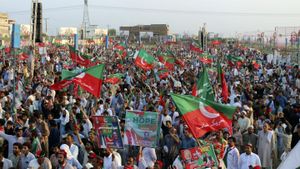India recently celebrated its inaugural National Space Day on August 23, commemorated across various platforms and institutions, highlighting one of the country's most significant achievements—the successful Chandrayaan-3 mission, which saw India become the first nation to land on the Moon's southern pole. This landmark event was marked with numerous celebrations, discussions, and activities nationwide, reflecting the enthusiasm and pride of the nation.
At this grand celebration, President Draupadi Murmu graced the event at New Delhi’s Bharat Mandapam alongside key figures such as ISRO Chairman Dr. S. Somanath and Minister of State for Space Dr. Jitendra Singh. The day began with recognition of the remarkable Chandrayaan-3 mission, which not only established India’s prowess but also underscored the country's commitment to advancing space exploration on the global stage.
Dr. S. Somanath delivered the welcome address and expressed his gratitude for the support received, particularly from Prime Minister Narendra Modi, whose vision has contributed significantly to ISRO's success. He stated, “It was on August 23, 2023, when Chandrayaan-3 made history with its successful lunar landing—a moment etched permanently in the annals of space exploration.” During this address, he announced the decision to officially recognize August 23 as National Space Day, alongside naming the landing site ‘Shiva Shakti Point’.
The Chairman's remarks extended beyond just historical acknowledgment; he emphasized the importance of international collaboration and the potential for India to play a leading role on the global space exploration front. “We hope this day inspires discussions around our challenges and the future direction for India’s space endeavors,” he added, setting the tone for the day’s celebrations.
On the academic front, several educational institutions across the country organized events to engage young minds with space science. For example, the Indian Institute of Astrophysics (IIA) hosted talks and workshops reflecting on the theme “Touching Lives While Touching the Moon”—a theme echoed at celebrations from Dehradun to Greater Noida. The aim was to not just celebrate past glories but to galvanize future generations toward space science and exploration.
Notably, the Swami Rama Himalayan University (SRHU) organized poster and rangoli competitions centered around space themes, attracting students from various backgrounds to engage creatively with the topic of space exploration. Vice-Chancellor Dr. Rajendra Dobhal highlighted the event, noting its importance as part of National Space Day celebrations, tying it back to the achievements of ISRO and India’s growing stature in the global space community.
Across the southern region, the Indian Institute of Technology (IIT) Bhubaneswar also hosted seminars discussing ISRO’s accomplishments, encompassing details on the Chandrayaan-3 and Aditya-L1 missions. Dr. Kuldeep Negi from ISRO shared insights about the future trajectories for India’s space missions, stressing the significance of governmental and institutional support for ambitious projects.
The theme of education and awareness was not limited to IITs and universities. The Jawaharlal Nehru Planetarium held public talks about the importance of space-based telescopes, focusing on how they contribute to our knowledge of the universe. Community engagement dragged more individuals toward the beauty of space exploration, reflecting India’s commitment to making space science accessible to everyone.
Another noteworthy venue was Bengaluru, where the Indian Institute of Astrophysics also marked the occasion with workshops and exhibitions. Space-themed activities engaged students and the public alike, showcasing models of spacecraft, including the Chandrayaan-3 and raising awareness about the advancements and future prospects of the nation’s space missions. Minister NS Boseraju opened the event, demonstrating governmental backing for science and technology initiatives.
Union Minister Sarbananda Sonowal celebrated National Space Day at Maritime Training Institute (MTI), underscoring the intersection between maritime and space endeavors. He encouraged young cadets to view the day not just as reflective but also as inspirational for future paths. His message rang clear—India’s evolution as a maritime power paralleled its ascent as a space leader.
Alongside these national celebrations, many speakers highlighted the remarkable growth of India's space sector over the past few years. Dr. Jitendra Singh noted the dramatic increase in the number of space startups, emphasizing how the nation successfully transitioned from one space startup three years ago to encompassing nearly 300 today. This boom reflects India’s readiness to expand its orbit of influence both domestically and globally.
Future missions were also part of the conversation. The concept of the Bharatiya Antariksha Station (BAS), scheduled to be operational by 2035, indicates India's strategic planning within the sector. Singh hinted at upcoming human missions, pointing out how one Indian astronaut will soon travel to the International Space Station (ISS) as part of collaborative endeavors.
Even through the exuberance of National Space Day, discussions about the upcoming challenges remained pivotal for speakers at events. There was consensus around the need for continued investment, both public and private, to propel India as a prominent leader not just within the fields of space and research but toward sustainable societal contributions using space technology. The successful launch of Aditya-L1 to study the sun indicates India’s steps toward more complex and ambitious space missions.
Despite the focus on technical developments, the emotional resonance of the day is what captivated many participants. The idea of touching lives through technology and bridging everyday societal contributions with complex scientific advancements was aptly captured by speakers throughout these events. The overarching sentiment was clear: India’s achievements in space are not merely about technology but about improving lives and enacting positive changes driven by innovations.
Overall, the celebration of National Space Day served as both reflection and projection—a moment for India to acknowledge its past but also to dream boldly for the future. With successful missions like Chandrayaan-3 serving as beacons of hope and ambition, the day inspired not just the scientific community but also the general populace to look upward and think beyond, toward new frontiers awaiting exploration.



